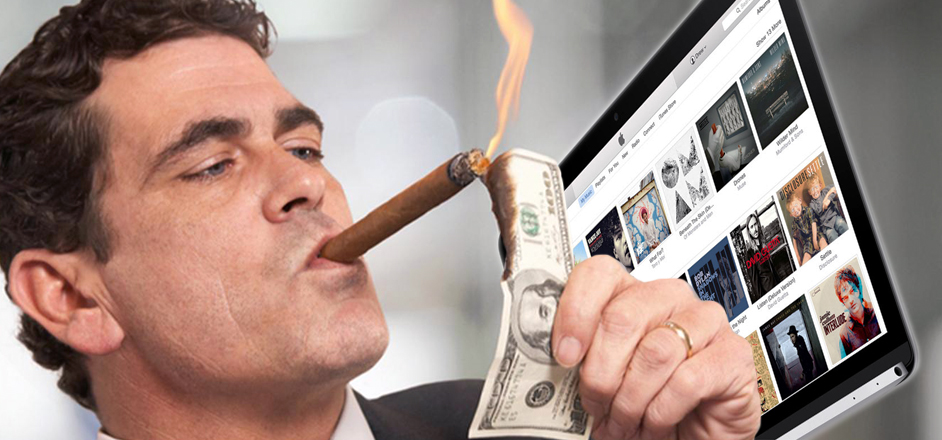Somebody paid big bucks for you to hear what they want you to hear.
The notion of choice seems like one of the few freedoms we have left. Which pair of shoes to wear? Those ones. Where to go to brunch? That place. Which song you want to hear? Not so fast, peasant, the fat cats at the top of the food chain have that all picked out for you already.
Somebody paid big bucks for you to hear what they want you to hear. The practice is shady as hell.
It’s an old-school term called “payola” — or bribing a person of influence (in this case, playlist creators) to push a label’s track harder than, say, an independent artist. The practice has been illegal since the mid-20th century, but laws weren’t written back then with the Internet in mind, so labels are reportedly taking advantage of the slow updates to the rules.
A few weeks back, Warner Music Group (one of the “Big 3”) announced that streaming is now its primary source of revenue, a first of its kind admission by a major label. It’s a huge mile marker for the industry, too, signifying a shift from physical music products to digital streaming, a revelation most everyone knew was coming eventually.
Stephen Cooper, Warner Music Group’s CEO, spoke with Billboard about about how necessary playlists are in the business equation when there’s so many millions of songs to pick from at any given second of the day.
“In the past it was about radio play, weekly charts and sales,” he says. “Now it’s a minute-by-minute battle for people’s time and attention. So playlisting is one of the big reasons why artists need record labels today.”
Playlists are one of the few tools labels have now to get their music randomly into the ears of the public. Companies like Spotify and Apple Music spend many millions of dollars to employ reputable curators that manage what artists go where and when. It’s essentially taking old-school radio tactics and evolving them for the net.
With enough money, however, some of these playlists are being tweaked to benefit certain artists while others get left in the dusty corners of data banks. You may want to kick back with your “Chill Out” tracks coming at you on a shuffle, or based off of your previous listening habits, but somebody like Justin Bieber is likely going to interrupt it for a few minutes because of someone rich who works for him, just so you can be marketed to unknowingly.
In an article written last year by Billboard’s Glenn Peoples, that kind of pay for play is “definitely happening,” says a major-label marketing executive. According to the source, a spot on prominent lists, listened to by millions of users, can cost anywhere from $2,000 to $10,000 — depending on how many followers a particular list has.
But it wouldn’t go directly to the company, no streaming site is likely that stupid to take bribes so brazenly, but the people they employ to build tracklists wouldn’t be in the 'wrong' taking a few hundo to slap a track where it might not belong. Tacky as hell, but according to the the payola statute, 47 USC Section 508, it’s not technically illegal because it only includes “all matter broadcast by any radio station.” Internet isn’t considered radio.
In response to questions posed about the practice, Spotify head of communications Jonathan Prince said Spotify doesn’t play that game. The company adamantly opposes such behavior of “accepting any compensation, financial or otherwise, to influence … the content included on an account or playlist.”
Payola (or “playola,” as it’s being called for hip Internet lingo) isn’t the end of the world right now, though. It’s not like 30 years ago when only a few dozen radio stations existed and there were very few other avenues of entertainment.
If you don’t want money to control what you listen to, don’t let it. Build your own playlists, discover your own tunes and use word of mouth from trusted friends to curate your own lifestyle. With a couple bazillion choices on the planet right now to choose from, exercise your freedom of choice by knowing and understanding big business tricks that are there solely to get you to do things they want you to.
The journey is often times more important than the destination, after all.




Leave a Reply